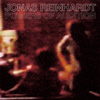 Few current artists are as conspicuously detached from their own era as San Francisco’s Jonas Reinhardt, as there is essentially nothing on Powers of Audition or 2008’s self-titled debut that betrays any inspiration gleaned from the last two decades of recorded music (or culture in general). Nevertheless, his influences are pretty eclectic within the narrow confines of analog’s golden age, as hints of space rock, early synth experimentalism, krautrock, and forgotten cult film soundtracks all find their way into his defiantly dated aesthetic.
Few current artists are as conspicuously detached from their own era as San Francisco’s Jonas Reinhardt, as there is essentially nothing on Powers of Audition or 2008’s self-titled debut that betrays any inspiration gleaned from the last two decades of recorded music (or culture in general). Nevertheless, his influences are pretty eclectic within the narrow confines of analog’s golden age, as hints of space rock, early synth experimentalism, krautrock, and forgotten cult film soundtracks all find their way into his defiantly dated aesthetic.
As expected, Jonas Reinhardt’s sophomore album brings yet another pleasant dose of spaced-out retro-krautrock, sequencer trance, and analog synthesizer worship. This time around, however, he has enlisted some actual human band mates to flesh-out his sound, turning a few tracks into an unexpectedly adrenalized Teutonic dance party. That newfound energy is balanced by another new addition: a unifying concept. Powers of Audition takes its title and theoretical premise from the idea that if a composer deliberately leaves blanks and spaces in a piece, a listener will use context and allusion to fill that void with an imagined resolution. That said, I did not notice any such holes when listening to the album. I will charitably hope that they were so skillfully incorporated that my subconscious eliminated them without my notice, but I have my suspicions.
The meat of Powers of Audition remains very much in the same vein as its predecessor: a mixture of burbling cosmic ambiance and a tense Vangelis- and Moroder-esque retro-futurism that recalls a host of late-night zombie and science fiction films from the early ‘80s. The addition of drummer Damon Palermo proves to be a welcome enhancement to the latter type, as the shifting unpredictability of his cymbal work in “Orbiter Dicta” adds greatly to its vitality and immediacy. Of course, Reinhardt gets by pretty well without Palermo too, as the darkly pulsing “Near A Mirrored Pit Viper” manages to wring a great deal of ominousness and power solely from throbbing electronics.
The degree to which Reinhardt has embraced live drums on some tracks may surprise some people, however, as the mechanized drum machine rhythms from Jonas’ last album that I liked so much are essentially gone altogether. Also, the addition of drums has coincided with some spirited forays in a much more “rock” direction, as Jonas has enthusiastically adopted some uncharacteristically muscular and propulsive motorik beats. It works fairly well though- unexpectedly bouncy pieces like “Atomic Bomb Living” and the title track recall Neu! at their grooviest and almost border on kitschy fun. I am not the target demographic for “fun,” but it certainly seems like those songs would translate much better into live performance than most of Reinhardt’s other material. Also, Klaus Dinger and Michael Rother don’t seem very likely to make further use of their signature rhythm anytime soon.
Powers of Audition is an enjoyable and successful album, though I am conflicted about Jonas’ shift towards rockin’ accessibility. On one hand, it is healthy to step away from the insular world of Tangerine Dream-y space explorations, but I personally prefer his weirder earlier works like “Crept Idea for a Mom.” Even so, this seems to be a transitional step in the right direction. While it would be unfair to describe Reinhardt’s work as “pastiche,” he has historically fit quite comfortably within the continuum begun by his influences. This album may be the harbinger of a more unique and widely appealing future, but I hope Jonas makes it there without losing any more of his quirky edges.
Samples:
Read More

